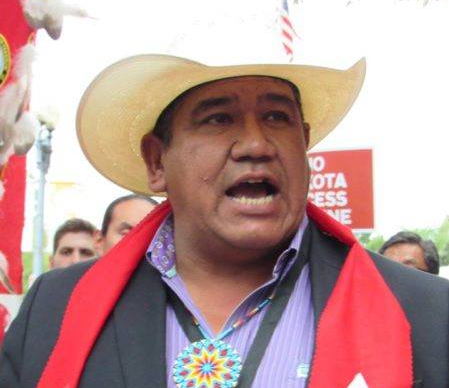
- Details
- By Native News Online Staff
EAGLE BUTTE, S.D. — Harold Frazier, tribal chairman of the Cheyenne River Sioux Tribe, on Monday endorsed Democratic nominee, former vice president Joe Biden, for president of the United States and asked “that everyone vote for Joe Biden this election.”
The election is 28 days away on Nov. 3. Voting has already begun in 18 states.
Frazier, who has been at odds with the Trump administration over the tribal checkpoints at the borders of the Cheyenne River Indian Reservation to stop the spread of Covid-19, says it is important to support a candidate for president who is willing to maintain a mutually respectful relationship between the federal government and tribal nations.
“Over the course of many years, I have had the opportunity to experience what it takes to lead a sovereign nation and I have seen the work Joe Biden did during his terms as vice president of the United States. I believe Mr. Biden will foster a mutually respectful relationship between the federal government and tribal nations,” Frazier said in his endorsement statement.
“It is important for all native nations to encourage tribal members to participate in the election process to ensure that tribal governments have a federal administration that is willing and welcoming of our desires of peace and honoring the treaties,” Frazier’s statement continued.
Perhaps as a jab at President Donald Trump, Frazier said, “We Native Americans are proud of our land and our participation in the beautifully diverse cultures we bring to this nation.”
In June 2020, the Cheyenne River Sioux Tribe (Tribe) filed a complaint against President Donald Trump and 10 other members of his administration, including Mark Meadows, the White House chief of staff; David Bernhardt, Secretary of the Interior; Tara MacLean Sweeney, Assistant Secretary-Indian Affairs, Department of the Interior; and Dr. Deborah Birx, White House coronavirus response coordinator.
Frazier is now in his second term as chairman of the Cheyenne River Sioux Tribe. In addition to serving as his tribe’s chairman, he is president of the Great Plains Tribal Chairmen’s Association. During the Standing Rock resistance to the Dakota Access pipeline, Frazier was one of the most outspoken American Indians who spoke out against the pipeline.
The Cheyenne River Sioux Tribe has a population of almost 16,000 tribal citizens.
Last week, the Mashpee Wampanoag Tribal Council passed a resolution at a Sept. 30 council meeting supporting Democratic presidential nominee Joe Biden for president, marking the first time ever the tribe has supported a presidential candidate.
More Stories Like This
Native News Weekly (August 25, 2024): D.C. BriefsMonday Morning (March 2, 2026): Articles You May Have Missed This Past Weekend
Native News Weekly (March 1, 2026): D.C. Briefs
Scope Narrowed, Report Withheld: Questions Mount Over Michigan Boarding School Study
Zuni Youth Enrichment Project Announces Family Engagement Night and Spring Break Youth Programming
Help us defend tribal sovereignty.
At Native News Online, our mission is rooted in telling the stories that strengthen sovereignty and uplift Indigenous voices — not just at year’s end, but every single day.
Because of your generosity last year, we were able to keep our reporters on the ground in tribal communities, at national gatherings and in the halls of Congress — covering the issues that matter most to Indian Country: sovereignty, culture, education, health and economic opportunity.
That support sustained us through a tough year in 2025. Now, as we look to the year ahead, we need your help right now to ensure warrior journalism remains strong — reporting that defends tribal sovereignty, amplifies Native truth, and holds power accountable.
 The stakes couldn't be higher. Your support keeps Native voices heard, Native stories told and Native sovereignty defended.
The stakes couldn't be higher. Your support keeps Native voices heard, Native stories told and Native sovereignty defended.
Stand with Warrior Journalism today.
Levi Rickert (Potawatomi), Editor & Publisher

